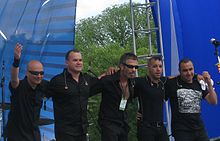- Mashina
-
Mashina (משינה) 
Background information Origin Tel Aviv, Israel Genres Pop rock, 2 Tone, New Wave, grunge Years active 1984–1995, 2003–present Website www.mashina.co.il Members Yuval Banai
Iggy Dayan
Avner Hodorov
Michel Benson
Shlomi BrachaMashina (Hebrew: משינה) are an Israeli pop rock band which was active from 1984 to 1995, and then again from 2003 to the present. The band is considered by many to be Israel's most important and influential rock band. Their musical style took inspiration from ska and hard rock, among others.
Contents
History
Mashina was formed by singer Yuval Banai, a member of the Banai family, probably Israel's best-known family of entertainers; father Yossi was an actor and singer, as are uncles Gabri and Ya'akov, along with most of Yuval's cousins. During his army service he met guitar player Shlomi Bracha and the two started playing music together. A friend of theirs, a recent Russian immigrant, suggested they call their band "Machina Vremeni", which means "time machine" in Russian (this suggestion may have been inspired by the well-known Russian rock band Mashina Vremeni of the 60's and 70's).
After the army service the two split up; Banai formed the band "Shlom Ha-Tzibur" ("Public Safety"), while Bracha teamed up with bassist Michael Benson to form the band "HaChazit Ha'amamit" ("The Popular Front"). In 1984 they decide to combine to form a new band, which they called Mashina, bringing in drummer Iggy Dayan; in 1985, they released their self-titled debut, which quickly became a hit on the Israeli charts. Later Avner Hodorov joined the band on keyboard and saxophone. They gained widespread popularity in Israel during the late 80's and early 90's.
In May 1995 the band announced their retirement and put together four heavily-publicized farewell shows. What would have been their fourth and final performance, in Arad, Israel, ended when three of the spectators were crushed to death by the crowd before the band went onstage. The band played another farewell concert several months later at Park HaYarkon, which they dedicated to the three deceased fans.
After Mashina broke up, Banai released 3 solo albums: "Yuval Banai" (1997), "Rashi Dub" (1999) (produced by bass player Yossi Fine) and "Nish'ar BaMakom" ("Staying in Place") (2001). Bracha released a solo album, and Benson co-founded the electronic-rock group Atmosfire, which came out with one album.
The band re-formed in 2003 and began touring and releasing albums again. On October 8, 2006, the band performed at the opening ceremony of the 27th Acco Festival of Alternative Israeli Theatre.
In 2008, Banai released another solo album, "Me'ever Le'harim" ("Over the Mountains"), produced by alt-folk singer Allan Moon.
In 2008, November 25, Mashina will come to Brazil for a giant show in Canecão, Rio de Janeiro. The show is in celebration for the 60 years of the state of Israel, organized by the youth group Habonim Dror. This event, called Messibá Habonim Dror, is expected to be the biggest event done by a Jewish group in Rio de Janeiro, and it's the first time of Mashina in Brazil.
Mashina has recently announced their comeback with a new album release in mid December 2008.
Music
The musical growth of Mashina can be mapped to different influences across their albums. Their early sound was obviously imitative of ska bands like Madness; they didn't bother to hide the influence, titling what became one of their earliest hit songs "Rakevet Laila Le-Kahir" ("Night Train to Cairo"), an homage to Madness' "Night Boat to Cairo", or "Geveret Sarah Hashchena" ("Miss Sarah, the Neighbour") that copied the theme, music and opening lyrics of Bob Dylan's "The Hurricane". Their subsequent albums combined reggae, punk rock and Middle Eastern elements. "Ha'Amuta Le-Heker Hatmuta" ("The Society for the Study of Mortality") sounds influenced by The Cure, "Miflatzot Ha-Tehila" ("The Monsters of Fame") sounds influenced by The Pixies, "Si Ha-Regesh" ("Emotional Peak") has the blues influence of Pink Floyd, and "Lehitra'ot Ne'urim Shalom Ahava" ("Goodbye Youth, Hello Love") has the anthemic quality of U2.
Their lyrics, tend to be cynical, sometimes humorously so. There are common themes of alienation, the struggle of everyday life and a desire for some sort of physical or spiritual escape.
Band members
- Yuval Banay - vocals, Acoustic Guitar
- Shlomi Bracha - Electric Guitar
- Iggy Dayan - drums
- Avner Hodorov - keyboard.Saxophone, Accordion
- Michael Benson - Bass Guitar
- Supporting members
Discography
Albums
Year Album Israel Certificate 1984 Mashina 2x Platinum 1987 Mashina 2 Gold 1988 Mashina 3 Gold 1990 Ha'Amuta Le-Heker Hatmuta Platinum 1992 Miflatzot Ha-Tehila Gold 1993 Si Ha-Regesh Platinum 1995 Lehitraot Neurim Shalom Ahava Platinum 1995 Mechonat Ha-Zman ("The Time Machine") Platinum 2003 Mashina Live 2003 Gold 2005 Romantika Atidanit ("Futuristic Romance") Gold 2010 Yahalomim Bashamaim ("Diamonds In The Sky") Compilations
Year Album Israel Certificate 1989 Gvirotay Ve-Rabotay ("Ladies And Gentlemen") 2x Platinum 1996 Ha'Osef Hasheni ("The Second Compilation") - Total sales: 420,000+
External links
Categories:- Israeli musical groups
- Banai family
Wikimedia Foundation. 2010.
